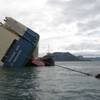DFDS and Port of Felixstowe Boost Ro-Ro Capacity
United Kingdom's Port of Felixstowe and Danish ferry operator, DFDS, have agreed to increase roll-on/roll-off (ro/ro) capacity at the UK port by over 40%.
The decision has come about after investment in a new linkspan, tractor units and additional trailer parking facilities.
As part of the investments, terminal operator Hutchison Ports has planned to replace one of the existing ro-ro bridges with a floating linkspan which is capable of handling the latest generation of ro-ro vessels.
Additionally, for unaccompanied ro-ro traffic, Hutchison Ports has planned to create over 300 additional trailer spaces.
Clemence Cheng, Chief Executive Officer at the Port of Felixstowe and Executive Director, Hutchison Ports, said: "As well as being the UK's largest container port, Felixstowe is also a key gateway for roll-on/roll-off trade with Europe. Demand on DFDS's service to Rotterdam has been growing steadily for a number of years and we are delighted to have agreed a new contract with them to secure the service at Felixstowe for another 15 years.
"The new contract includes a significant investment by Hutchison Ports replacing one of our existing ro/ro bridges with a modern floating linkspan capable of handling the latest generation of ro/ro vessels and creating over 300 additional trailer spaces for unaccompanied ro/ro traffic."
Niels Smedegaard, CEO & President of DFDS, said: "We are very happy to continue our excellent relation with the Port of Felixstowe and their ro/ro staff. We are very excited about this investment which allows us to further enhance the high level of customer service that is expected by our clients. It is also a further step in our striving to provide necessary capacity to continue supporting our customers' trade and business, even in a possible post-Brexit world."
Clemence Cheng added: "This investment is driven by our long-term confidence in the ro/ro route between Felixstowe and Rotterdam. We are seeing increasing interest in both ro/ro and short sea container connections at all three of our UK ports as shippers seek to minimise risks to their supply chains resulting from Brexit."













